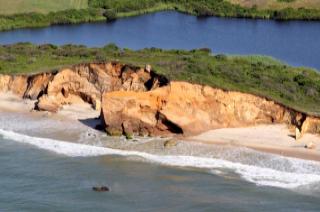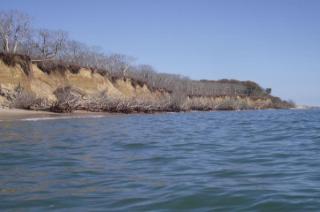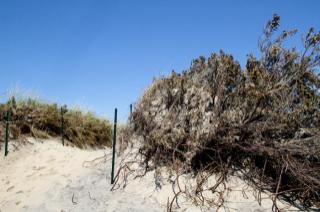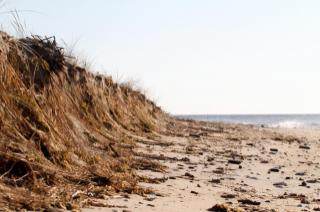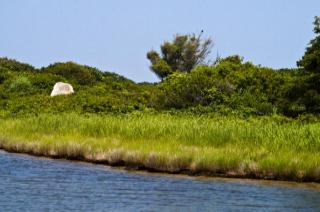Erosion
2012
As drastic erosion continues to eat away at Chilmark’s south shore, town officials this week expressed grave concern for public safety and impeded access to Lucy Vincent and Squibnocket beaches. The Chilmark board of selectmen also approved a study for the extreme Upper Chilmark Pond, known as Upper Upper Chilmark Pond to some, for a possible dune restoration project.
For the first time in living memory, Wasque Point on Chappaquiddick, a famed spot where riptides attract thousands of saltwater fishermen each year, will be inaccessible for much of the summer. The reason is the ferocious erosion now eating away huge chunks of the southeastern corner of Chappaquiddick at a rapid rate. The once-wide sandy beach at Wasque Point has been replaced by 20 to 28-foot sheer cliffs, with truckloads of uprooted pine and oak trees stuck in the crashing surf at their base.
2011
The Chilmark Conservation Commission issued an emergency work certificate this week for two perilously-perched cottages on the cliffs of Stonewall Beach, fearing if they are not moved back from the edge they will fall into the ocean.
Natalie Conroy’s two small cottages on her property off State Road in Chilmark must be moved after tropical storm Irene stripped off 10 feet of cliff where the structures stand.
While tropical storm Irene did little damage inland save a good salt blasting and natural pruning of trees, the storm drastically reshaped parts of the Island’s coastline when it blew through last Sunday. At Wasque Reservation on Chappaquiddick, 22 feet of south-facing beach fell into the ocean in a 24-hour period. And around the Island conservation officials reported significant losses of beachfront and dramatically altered shorelines. Beaches that were wide ribbons of sand just last week are now nothing but rocks and boulders, and vice versa.
A bill which has been quietly making its way through the state house could dramatically affect the future ownership of some of the Vineyard’s pristine barrier beaches, moving them from private hands to public.
The bill, which consists of just a single paragraph, relates to the barrier beaches that separate the Island’s Great Ponds from the ocean. Many of these beaches are privately owned and also are retreating into the ponds as they are eroded on their seaward side.
Living Local’s Meaty Side
The recent move by the Island Grown Initiative and the Martha’s Vineyard Agricultural Society to form a partnership to consider construction of a facility where Vineyard farmers can have their sheep, cattle and pigs safely, humanely and cleanly converted to cuts of meat for sale and home use is encouraging.

